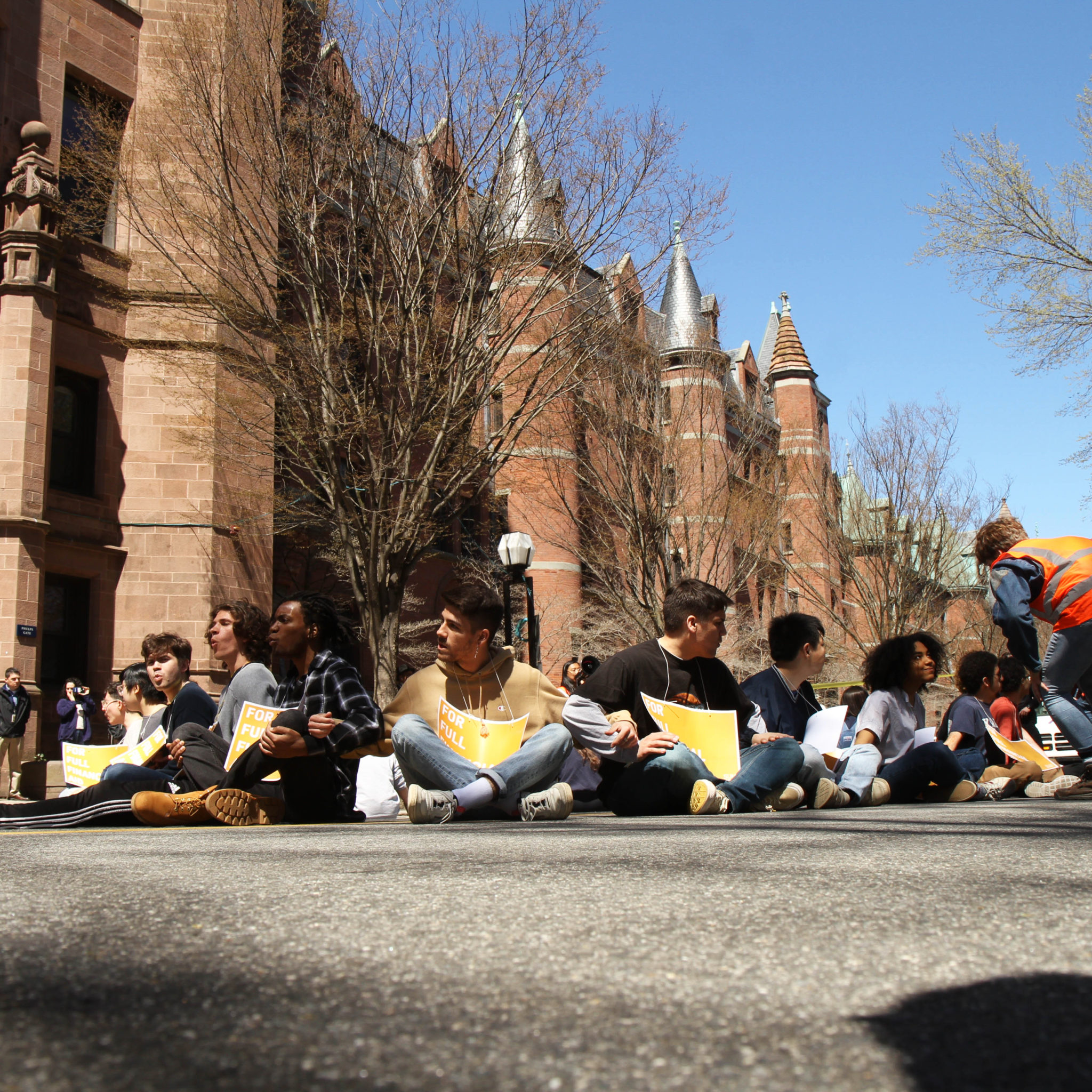
Courtesy of Hannah Schmitt
The longstanding battle between the Yale administration and Students Unite Now — a student group also known as SUN that advocates for the end of the student effort portion of financial aid, colloquially known as the student income contribution — came to a head this past week when 24 students were arrested Monday and Tuesday as part of sit-ins in front of Sheffield-Sterling-Strathcona Hall and Phelps Gate.
Five students were arrested on Monday evening in front of SSS, and on Tuesday afternoon, 19 others were arrested in front of Phelps Gate for blocking traffic. The protests came as many prospective Yalies traversed campus for Bulldog Days, Yale’s annual three-day program for prospective first years. According to the University’s financial aid website, the student effort is “a standardized estimate of a student’s ability to contribute financially to her/his educational costs while enrolled at Yale.” Composed of two parts — student employment and the student share through summer employment — most of the student effort amount is not paid directly to Yale, but rather, it is used for unbilled costs such as textbooks.
Still, supporters of SUN said this financial aid policy can lead to a socioeconomic disparity in college experiences.
“I think the administration hears what we’re doing loud and clear, and I think it’s on them to decide what to do,” said Julia Salseda-Angeles ’19, one of the organizers of the protest. “Students have demonstrated over and over again over the past six years, that this is a really harmful and unfair policy.”
According to Salseda-Angeles, the protests were purposefully planned in conjunction with Bulldog Days to advocate on behalf of the incoming class.
“We’re fighting for the class of 2023,” she said. “I’m a senior, I’m about to graduate, so I’ve paid my SIC for four years. I want the class of 2023 to have a different experience than I had.”
In a comment to the News regarding the SUN protests, Dean of Undergraduate Admissions and Financial Aid Jeremiah Quinlan noted that registrations for Bulldog Days and Bulldog Saturday “are the highest on record” and emphasized the large attendance for events like the Welcome Showcase and the Extracurricular Bazaar.
Director of Undergraduate Financial Aid Scott Wallace-Juedes similarly said that during Bulldog Days, his office has “met with dozens of admitted students and parents.” But he did not comment on the timely protests.
“I am confident that Yale’s extraordinary need-based financial aid awards meet 100 percent of every admitted students’ demonstrated financial need,” he said. “… I appreciate the extraordinary efforts of the staff at the Office of Undergraduate Admissions and the Office of Undergraduate Financial Aid have made to explain Yale’s policies.”
But SUN contends that Yale does not fulfill 100 percent of student financial need, as Yale does not cover the student effort. SUN’s movement has garnered support from the YCC.
According to YCC President Saloni Rao ’20, the YCC has long had conversations with SUN leadership and has tried to give the group more social visibility through YCC newsletters and YCC social media.
Rao added that the YCC has been working with the admissions and financial aid office to clarify its language regarding financial aid.
But at a town hall on March 2, Dean of Yale College Marvin Chun said that “eliminating student share altogether is just not possible.”
“[There are a] wide variety of complex reasons, but the main reason is just that Yale’s financial aid package is already amongst the most competitive and generous in the country,” Chun said. “Anything beyond that, for lack of a better word, will be kind of a luxury.”
Last year, University President Peter Salovey similarly said Yale would not eliminate the student share in its next capital campaign, which is currently in its silent phase.
The student effort for most upper-level students with standard levels of need is $5,950 per year.
Alayna Lee | alayna.lee@yale.edu
Kelly Wei | kelly.wei@yale.edu







